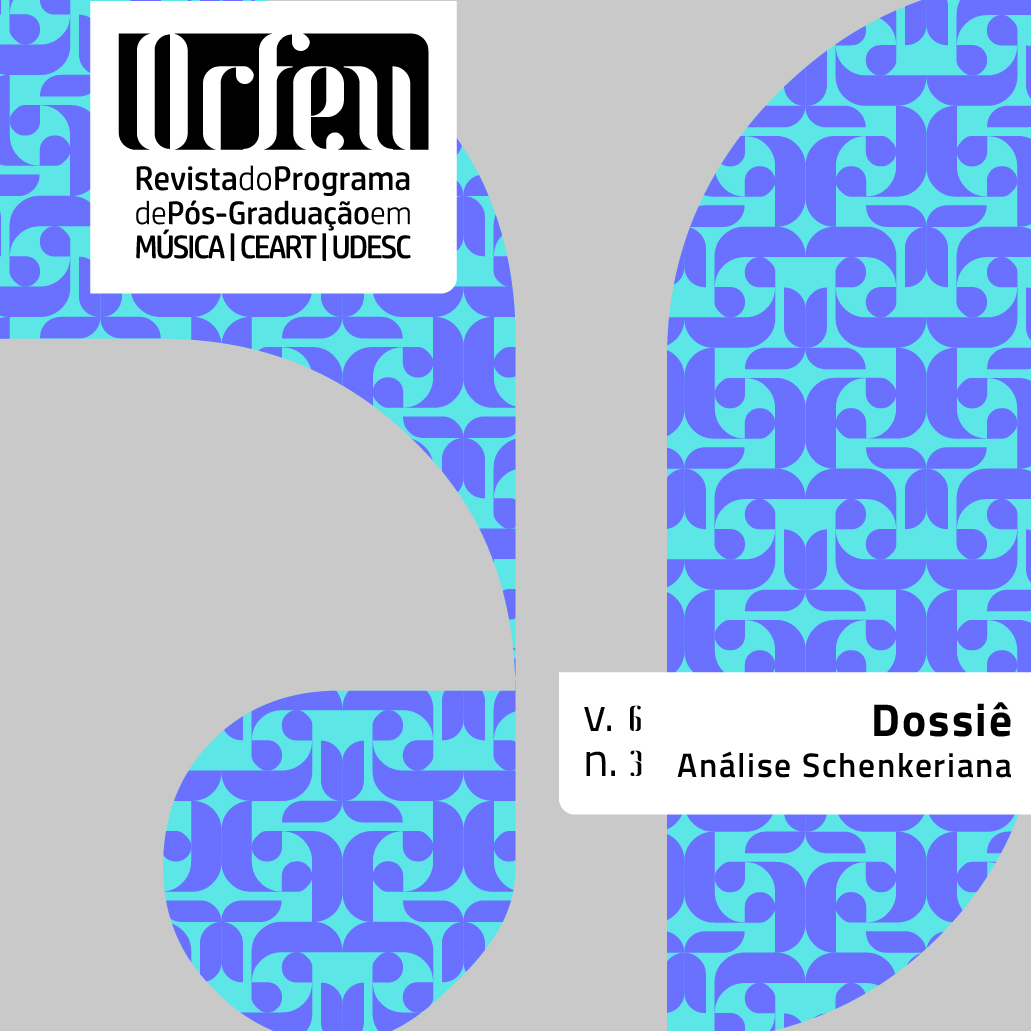As transformações do organicismo e do conceito de motivo na teoria schenkeriana
DOI :
https://doi.org/10.5965/2525530406032021149Mots-clés :
Análise Schenkeriana, teoria musical, filosofia da música, epistemologiaRésumé
Este artigo elabora uma leitura sobre a trajetória da teoria schenkeriana: das reflexões sobre a linguagem e a genealogia da música no artigo de 1895, Der Geist der Musikalischen Technik, até a expressão derradeira de sua metodologia analítica em 1935, em Der Freie Satz. Reúne as questões que motivaram o desenvolvimento dessa teoria, dando especial enfoque às transformações do conceito de motivo e das metáforas organicistas. Observa como esses dois aspectos são desenvolvidos conjuntamente ao longo de 40 anos de produção teórica, demonstrando a íntima conexão entre aspectos técnicos e teóricos. A resolução de problemas, como a causalidade musical e a associação de ideias em sua teoria, é investigada à luz desses aspectos, motivando reflexões epistemológicas e filosóficas sobre o desenvolvimento da complexa musicologia de Schenker. Na exposição desta trajetória, o artigo se depara com diversas questões-chave que compreendem e antecipam o posterior desenvolvimento do método que denominamos hoje em dia como Análise Schenkeriana. Busca-se, com essa exposição, fomentar um diálogo mais complexo da teoria schenkeriana, tanto com o neo-schenkerianismo quanto com correntes do pensamento além do âmbito musicológico.
Téléchargements
Références
AGAWU, Kofi. Schenkerian Notation in Theory and Practice. Music Analysis, v. 8, n. 3, p. 275-301, 1989.
BOUCQUET, Kristof. Schenker and Schoenberg revisited. Revue Belge de Musicologie, v. 59, p. 193-203, 2005.
COHN, Richard. Schenker’s Theory, Schenkerian Theory: Pure Unity or Constructive Conflict? Indiana Theory Review, n. 13, v. 1, p. 1-19, 1992.
COHN, Richard; DEMPSTER, Douglas. Hierarchical Unity, Plural Unities. In: BERGERON,
Katherine; BOHLMAN, Philip V. (ed.). Disciplining Music. Chicago: Chicago University Press, 1992. p. 156-181.
COOK, Nicolas. The Schenker project: Culture, Race, and Music Theory in Fin-de-siècle Vienna. Oxford: Oxford university press, 2007.
FINK, Robert. Going flat: Post-Hierarchical Music Theory and the Musical Surface. In: Rethinking Music. Ed. COOK, Nicholas and EVERIST, Mark, Oxford: Oxford University Press, 2001.
FLESHNER, Nathan. The Musical Psyche: Interactions Between the Theories of Heinrich Schenker and Sigmund Freud. Tese (Doutorado em Música) – Department of Music Theory, Eastman School of Music, University of Rochester, Rochester, 2012.
FORTE, Allen. Schenker’s conception of music structure. Journal of Music Theory, v. 3, n. 1, p. 1-30. 1959
FORTES, Rafael. A estrutura orgânica da música na teoria schenkeriana. Tese (Doutorado em Música). Programa de Pós-Graduação em Música, Centro de Letras e Artes, Universidade Federal do Estado do Rio de Janeiro, Rio de Janeiro, 2020a.
FORTES, Rafael. Estratégias de expansão da Teoria Schenkeriana a partir da música de Igor Stravinsky. Debates Unirio, n. 24, p.74-118, out. 2020b.
KORSYN, Kevin. Schenker’s organicism reexamined. Intégral, v. 7, p. 82-118, 1993.
MORGAN, Robert. Music theory, analysis and society: selected essays. London; New York: Routledge, 2016.
PASTILLE, William. Heinrich Schenker: anti-organicist. 19th-Century Music, v. 8, n. 1, p. 29- 36, 1984.
PASTILLE, William. Schenker’s value judgments. Journal of the Society of Music Theory, v. 1, n. 6, 1995.
PASTILLE, William; CADWALLADER, Allan. Schenker’s High-level motives. Journal of Music Theory, v. 36, n. 1, p. 119-148, 1992.
ROTHSTEIN, William. The Americanization of Heinrich Schenker. In: Schenker Studies. Ed. Hedi Siegel, New York: Cambridge Univ. Press, p. 193-203, 1990.
SCHENKER, Heinrich. Harmony. Chicago: Chicago university Press, 1968 [1906].
SCHENKER, Heinrich. Five Graphic Music Analysis. New York: Dover, 1969 [1932].
SCHENKER, Heinrich. Free composition. New York: Schimmer Books, 1979 [1935].
SCHENKER, Heinrich. The spirit of musical technique [Der Geist der Musikalischen Technik, 1895]. Trad. William Pastille. In: Heinrich Schenker: anti-organicist. 19th-Century Music, v. 8, n 1, p. 29-36, 1984 [1895].
SCHENKER, Heinrich. Counterpoint: a Translation of Kontrapunkt. New York: Schimmer Books, 1987a [1910]. v. 1.
SCHENKER, Heinrich. Counterpoint: a Translation of Kontrapunkt. New York: Schimmer Books, 1987b [1922]. v. 2.
SCHENKER, Heinrich. Der Tonwille: pamphlets in witness of the immutable laws of music. Oxford: Oxford University Press, 2004 [1921-1923]. v. 1, issues 1-5.
SCHENKER, Heinrich. Der Tonwille: pamphlets in witness of the immutable laws of music. Oxford: Oxford University Press, 2005 [1923-1924]. v. 2, issues 6-10.
SCHENKER, Heinrich. The decline of the art of the composition: a Technical-Critical Study. Music Analysis, v. 24, n. 1/2, p. 33-129, 2005 [1905].
SCHENKER, Heinrich. The spirit of musical technique [Der Geist der Musikalischen Technik, 1895]. Trad. William Pastille. In: COOK, Nicolas. The Schenker project: Culture, Race, and Music Theory in Fin-de-siècle Vienna. Oxford: Oxford university press, 2007 [1895]. p. 319-332.
SCHENKER, Heinrich. The Masterwork in Music. Ed. William Drabkin. New York: Dover, 2014a [1925]. v. 1.
SCHENKER, Heinrich. The Masterwork in Music. Ed. William Drabkin. New York: Dover, 2014b [1926]. v. 2.
SCHENKER, Heinrich. The Masterwork in Music. Ed. William Drabkin. New York: Dover, 014c [1930]. v. 3.
SCHENKER, Heinrich. Piano sonata in A major, op. 101: Beethoven’s last piano sonatas, an edition with elucidation, volume 4. Trad. John Rothgeb. Oxford: Oxford University Press, 2015 [1921].
SOLIE, Ruth. The Living Work: Organicism and Musical Analysis. 19th-Century Music, n. 4, v. 2, p. 147-156, 1980.
WATKINS, Holly. Metaphors of Depth in German Musical Thought (from E.T.A. Hoffman to Arnold Schoenberg). Cambridge: The Cambridge University Press, 2011.
WATKINS, Holly. Toward a post-humanist organicism. Nineteenth-Century Music Review, 14, p. 93-114, 2017.
WATKINS, Holly. Musical vitalities: ventures in a biotic aesthetics of music. Chicago: The University of Chicago Press, 2018.
Téléchargements
Publiée
Comment citer
Numéro
Rubrique
Licence
(c) Tous droits réservés Rafael Fortes 2021

Ce travail est disponible sous la licence Creative Commons Attribution 4.0 International .






